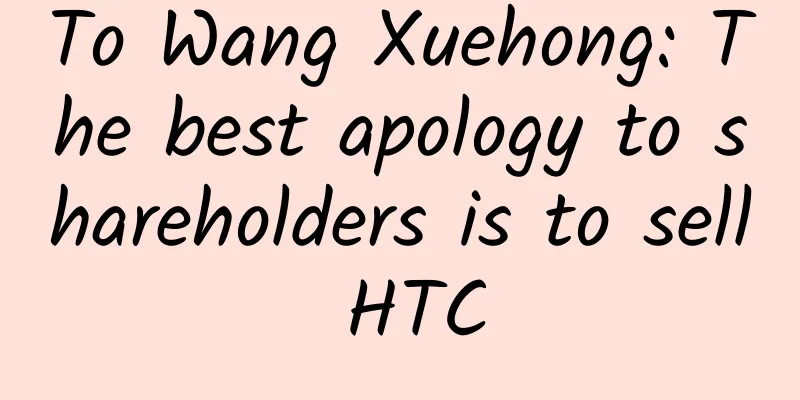To Wang Xuehong: The best apology to shareholders is to sell HTC

|
Recently, HTC CEO Wang Xuehong bowed and apologized to shareholders at the shareholders' meeting she presided over for HTC's poor market and stock price performance. Although Wang Xuehong's sincerity is quite touching, it also shows from one side the degree of danger HTC is in and the industry's extreme concern and disappointment about HTC's future. So why do the industry, including HTC's shareholders, have no hope for HTC's future? In fact, since 2013, HTC's performance has been fluctuating, and its position and influence in the smartphone market have gradually shrunk in this ups and downs. However, due to the adjustment of product and marketing strategies, HTC's performance rebounded last year. According to statistics, HTC's revenue last year was NT$190.6 billion (about RMB 37.7 billion), an increase of 8% over 2013, and its net profit was NT$20.7 billion (about RMB 4.094 billion), an increase of 16% over 2013. For a company that is shrinking and declining as a whole, it is still good to achieve such performance, at least it makes the industry feel the signs of HTC's recovery. So the question is, since the performance has improved, why do you still suggest selling HTC? Perhaps the industry has noticed that shortly after Wang Xuehong bowed to shareholders to apologize, she unexpectedly and drastically lowered HTC's performance expectations for the second quarter ending June 30 this year, that is, sales were lowered to NT$33 billion to NT$36 billion. This expectation is almost half of the company's revenue of NT$65.06 billion in the second quarter of 2014, and is far lower than HTC's previous forecast of NT$46 billion to NT$51 billion; in terms of profit, the net loss may be between NT$7.95 billion (about US$257 million) and NT$9.05 billion, which will end HTC's previous four consecutive quarters of small profits. What happened that made HTC drastically lower its performance expectations? After all, in the first quarter of this year, HTC's revenue increased by 25% year-on-year. The profit turned from loss to loss to US$11.6 million year-on-year. However, if we look back one quarter, the clues will be revealed. That is, the revenue in the first quarter of this year decreased by 13% compared with the fourth quarter of last year, and the profit decreased by 23%. That is to say, from the fourth quarter of last year to the second quarter of this year (expected), HTC's revenue and profit showed a clear and sharp decline. This period of time is exactly the critical period when Apple's iPhone 6 and iPhone 6 Plus, Samsung's Galaxy S6 and Galaxy S6 Edge, and its own HTC One M9 flagship phones have all been launched and started the game. At this critical period, HTC's sharp reduction of its performance expectations undoubtedly proves that HTC has lost in the battle for new flagship phones this year. This is also confirmed by the latest news that HTC will cut the production of flagship phones by 30% and will write down $93 million in assets in the second quarter. As for why HTC lost in the new round of flagship phone competition, in addition to the saturation of the high-end phone market leading to more intense competition, the lack of differentiated selling points compared with the previous generation M8 and even M7 should be the main reason. In comparison, although the industry has also criticized Apple iPhone 6 and Samsung Galaxy S6 for their lack of innovation, compared with HTC, Apple and Samsung at least have differentiated features compared with their previous products, such as the large screen of iPhone 6 and the curved screen of Samsung Galaxy S6. The reason why we analyze HTC's flagship phone here is that the high-end HTC One M9 is still an important source and guarantee of HTC's revenue, profit and brand image. However, judging from the market performance, the factors that determine HTC's development momentum this year no longer exist. As a result, due to HTC's failure in the high-end market in the first half of this year and throughout the year, it has to seek growth opportunities in the mid- and low-end markets to make up for the losses in the high-end market. However, the industry knows that the mid- and low-end markets are currently the most concentrated and fiercely competitive markets for mobile phone manufacturers, especially Chinese mobile phone manufacturers. This fierceness is reflected in the high-end configurations at mid-end prices, mid-end configurations at low-end prices, and low-end mobile phones are sold at a loss. In other words, HTC's mid-end mobile phone market faces competition from high-end mobile phones from Chinese mobile phone manufacturers (in the same price range). Here we have to mention HTC's positioning and market strategy. Although HTC increased its efforts to develop the mid- and low-end mobile phone market last year and seems to have achieved certain results, HTC's high-end complex has never changed from the bottom of its heart, which has caused HTC to worry about gains and losses in the competition in the mid- and low-end markets and lost the opportunity to grab more market share in the mid- and low-end markets last year. What makes us feel that HTC is hopeless is that at this year's MWC, HTC executives once again denied the competition strategy with Chinese manufacturers (such as Lenovo, Xiaomi, etc.), that is, they are not HTC's competitors (implying that Apple and Samsung are), plus Wang Xuehong and Zhou Yongming have repeatedly expressed their disdain for cheap mobile phones. So this year, the global mobile phone market (including China) has slowed down, competition has become more intense, and HTC has lost in the high-end market with what it considers to be its competitors. HTC's wavering strategy of worrying about gains and losses has not changed, making it even more difficult to say whether it has any chance. It is worth mentioning that the reason why HTC's performance rebounded last year was related to its cost reduction. It was not because of how outstanding and competitive its performance was in the mid- and low-end markets. It was precisely because HTC had already started to cut costs last year that the space for cost reduction or the role of curbing performance decline through cost reduction, one of the four measures implemented by HTC's head Wang Xuehong in the second half of this year, has been released in advance. As for other measures such as strengthening the development of smart phones, optimizing internal processes, and actively developing new businesses, it is difficult to see actual benefits at least in the short term, and it is full of variables. According to relevant statistics, since the release of HTC One M9, HTC's stock price has fallen by 50% and its current market value is only about 2 billion US dollars. In 2011, when HTC was at its peak, its market value was as high as 33.8 billion US dollars. Although HTC recently launched a so-called rectification strategy, due to its core smartphone business strategy still wavering and blind, and the lack of product competition (it is not as simple as Wang Xuehong said that there is a problem with marketing), the possibility of recovery is almost zero. In addition, it does not have an independent ecosystem and patents like BlackBerry that can maintain value or at least slow down the accumulation of corporate depreciation. The future market value of HTC can only go lower and lower, so we believe that Wang Xuehong's best apology to shareholders is to sell HTC at an appropriate time. As a winner of Toutiao's Qingyun Plan and Baijiahao's Bai+ Plan, the 2019 Baidu Digital Author of the Year, the Baijiahao's Most Popular Author in the Technology Field, the 2019 Sogou Technology and Culture Author, and the 2021 Baijiahao Quarterly Influential Creator, he has won many awards, including the 2013 Sohu Best Industry Media Person, the 2015 China New Media Entrepreneurship Competition Beijing Third Place, the 2015 Guangmang Experience Award, the 2015 China New Media Entrepreneurship Competition Finals Third Place, and the 2018 Baidu Dynamic Annual Powerful Celebrity. |
<<: How much potential does NetQin's technology line have under the Blueberry strategy?
>>: How does Uber solve the identity problem in the United States?
Recommend
The 2019 WeChat data report is out! In addition to announcing the most popular emojis, the top ten buzzwords of the year were also revealed.
On the morning of January 9, 2020, the annual WeC...
Now, it’s time to go high-end! The road to another breakthrough for domestic mobile phones
Just after the Spring Festival, Xiaomi mentioned ...
Spring is the right time to lose weight, but how can you effectively reduce excess fat in your body?
With the end of winter, many people are planning ...
Is it not because of the cold that we exhale white air in winter? There is no white air in Antarctica!
The temperature has dropped continuously in recen...
Man sues bank after girlfriend secretly shops online
A young man born in the 1980s found that the paym...
How to improve conversion rate and encourage users to place more orders?
There are many scenarios for users to place order...
Overseas promotion methods that you must know before your products go global!
1. Set a strategy Before doing overseas promotion...
"Health from eating" series | Why does black wolfberry change color when soaked in water? Talk about the eating tips of black wolfberry
Black wolfberry, also known as black wolfberry or...
Case Analysis: How to use the AARRR model to increase user growth?
This article takes Luckin Coffee as an example. I...
A big pot of 10 H5 front-end frameworks
As a siege fighter who has been working on the fr...
Tencent advertising strategy for the wedding photography industry
1. The market size of the wedding photography ind...
8 routines = 1 "Internet celebrity" brand
In 2021, the concept of "new consumption&quo...
How to better utilize material and spiritual resources to motivate users?
As long as the product is valuable, people will u...
New quantum charging technology: Fully charging an electric car in as fast as 9 seconds?
With the popularity of electric vehicles, more an...
The most powerful Zhihu promotion and drainage method in 2019
A few days ago, my famous Zhihu account in the sk...







![niaoniao's 18th C4D+OC rendering course will end in January 2022 [HD quality with materials]](/upload/images/67cbff58eb0ad.webp)

